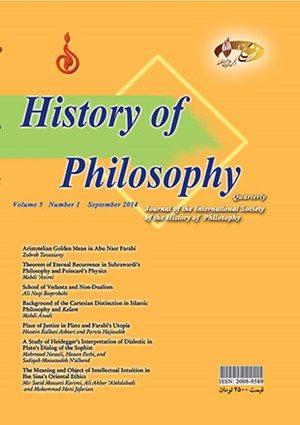Aristotelian Golden Mean in Abu Nasr Farabi
Subject Areas : Geneology of philosophical schools and Ideas
1 -
Keywords: Ethics State Happiness Farabi Knowledge Aristotle Mean ,
Abstract :
From among the views propounded in the field of ethics, Aristotle’s theory of golden mean has attracted the greatest attention of Muslim philosophers, including Farabi, who is considered to be the founder of Islamic philosophy. The problem here is whether Farabi himself was merely content with a pure imitation, explanation, and expansion of Aristotle’s theory in designing his ethical system or developed his independent view in the realm of ethics. Through presenting a documented report of Farabi’s views in ethics, the present paper intends to demonstrate that, in spite of Aristotle’s undeniable influence on his thoughts in the development of some of his philosophical principles in the field of ethics, such as considering happiness to be the ultimate goal and resorting to the theory of the mean in explaining virtues and posing Aristotle’s four-fold virtues, Farabi was never content with a mere explanation of Aristotle’s ideas in this regard and, on the contrary, presented his own specific theories. Clearly, Farabi promotes happiness from the level of a purely ethical concept with an individualistic bent to the level of a social concept and considers it to be the foundation of the political systems that are based on virtue. He also enters some purely religious features into this field and clearly explains them. However, his ideas in this regard are not immune to criticism. What places Farabi with regard to his ethical theories in the same line with Aristotelians is the problem of proposing the mean as the criterion for determining moral virtues. Through emphasizing this problem, this paper intends to demonstrate how Farabi has organized his ethical system based on the elements he has borrowed from Aristotle.
ابنمسکويه، ابوعلي، تهذيب الاخلاق، بينا، بيروت، 1403 ق. #
ابنمسکويه، ابوعلي، تهذيب الاخلاق و تطهير الاعراق، قم، انتشارات بيدار، مطبعة امير، 1411 ق. #
ارسطو، اخلاق نيکوماخوس، ترجمه محمدحسن لطفي، تهران، انتشارات طرح نو، چ3، 1389. #
افلاطون، جمهوري، ترجمه فواد روحاني، تهران، بنگاه ترجمه و نشر کتاب، 2535. #
پاپکين، ريچارد؛ استرول، آوروم، کليات فلسفه، ترجمه و اضافات سيدجلالالدين مجتبوي، تهران، انتشارات حکمت، چ3، 1402 ق. #
پينکافس، ادموند، از مسئله محوري تا فضيلتگرايي، ترجمه حميدرضا حسني و مهدي عليپور، قم، دفتر نشر معارف، چ1، 1382. #
دهخدا، علي اکبر، لغتنامه دهخدا، دانشگاه تهران، ج1، چ1، 1373. #
الطريحي، فخرالدين، مجمعالبحرين، سيداحمد الحسيني، مرتضوي، ج 5، 1362. #
فارابي، ابونصر، انديشههاي اهل مدينه فاضله، ترجمه و تحشيه سيدجعفر سجادي، سازمان چاپ و انتشارات وزارت فرهنگ و ارشاد اسلامي، 1379. #
فارابي، ابونصر، احصاء العلوم، قدمله و شرحه و بوبّه علي بوملحم، بيروت، لبنان، دارمکتبه الهلال، 1412ق. #
فارابي، ابونصر، السياسة المدنية (الملقب بمبادي الموجودات)، حققه و قدم له و علق عليه فوزي متري نجار، انتشارات الزهرا، 1366. #
فارابي، ابونصر، سياست مدينه، ترجمه و تحشيه سيدجعفر سجادي، تهران، وزارت فرهنگ و ارشاد اسلامي، 1379. #
فارابي، ابونصر، فصول منتزعه، حققه و قدّم له و علّق عليه فوزي نجار، المکتبة الزهرا، 1405 ق. #
فارابي، ابونصر، فصوص الحکم، شرحه للسيد اسماعيل الحسيني الشنب غازاني، مع حواشي الميرمحمدباقر الداماد، تحقيق علي اوجبي، تهران، انتشارات حکمت، چ 1، 1389 (1431ق). #
فارابي، ابونصر، الجمع بين رأيي الحکيمين، قدم له و علق عليه البير نصري نادر، چ1، بيروت، دارالمشرق/ چ2، ايران، المکتبة الزهرا، 1405 ق. #
فارابي، ابونصر، تحصيل السعادة، قدّم له و علّق عليه و شرحه علي بوملحم، بيروت، دارمکتبه الهلال، 1412 ق. #
کاپلستون، فردريک، تاريخ فلسفه، ج1، ترجمه سيدجلال الدين مجتبوي، مرکز انتشارات علمي فرهنگي، چ1، 1362. #
ناظرزاده کرماني، فرناز، فلسفه سياسي فارابي، تهران، انتشارات دانشگاه الزهرا، 1376. #
Aristotle, Nicomachean Ethics, Book II, 1103a14-25, 55n1. #
Gerard, J. Hughes, “Aristotle on Ethics”, Philosophy Guidebooks, edited by Tim Crane and Jonathan Wolff, University College London. #
Korsgaard, M., “Teleological Ethics”, in Routledge Encyclopedia of Philosophy, vol. 9. #


